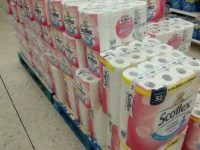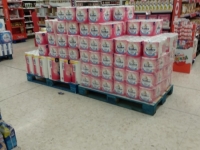Business
TOILET PAPER vs CORONA IN SPAIN
Sales have increased 129% in confinement
USPA NEWS -
Since Saturday, March 14, Spain has been on alert for the Coronavirus pandemia and the population confined to avoid infections. Despite the information that is continuously provided by the healt authorities, the Spaniards are afraid. For this reason, they compulsively launch themselves to buy in supermarkets not only food: the shopping star is toilet paper.
Mountains of toilet paper in shopping carts, empty shelves because new stocks disappear in a few minutes and supermarkets that cannot replenish the product quickly. It is the photograph that is repeated in Spanish supermarkets since, last week, the Government announced the declaration of the state af alert and the confinement in their homes of the Spaniards. Since last Saturday, shops, bars and restaurants have been closed by government order. Only supermarkets, pharmacies and tobacconists remain open. It is the first time that such a measure has been taken in Spain and the Spaniards, forced to stay at home, except to buy, go to the doctor or the bank, have massively bought food, drinks... and toilet paper.
In November and December 2010, as a consequence of a strike by air traffic controllers, the Socialist Government of then President Jose Luis Rodriguez Zapatero declared a state of alarm, but did not affect citizens. The confinement of the Spaniards is a novelty and the citizens have launcehd themselves to buy compulsively. In principle, confinement will last 15 days, but experts and the Govenment warn that it will most likely have to be extended because more time is needed to contain the transmission of the Corona in society.
With this fear, the Spaniards have secluded themselves in their homes and only go out to, in addition to buying or going to the doctor, going to work, walking the dog or caring for dependent people. In their closets and refrigerators there are supplies for two weeks, although the Government and the big distribution companies insist that there is not and there will be no shortage of any product. What is scarce from early morning is toilet paper in supermarkets. Is it because the Spaniards expect to go to the toilet more frequently than usual? Psychologists say no.
The explanation is psychological. According to psychologists, people tend to react to situations that they do not control, focusing on things that they do control. That's, if they can't control the confinement order, at least they can control what's in their pantries. According to the Spanish expert in consumer habits Maria Jose Lechuga, “human beings react with extreme patterns to emergency situations, such as filling our pantries before a possible food shortage.“
However, food is not what most Spaniards buy these days. Sanitary products, face masks, disinfectant gels and toilet paper are the best-selling products. For example, toilet paper sales have increased 129% from the previous two months, according to consulting firm Kantar Worldpanel. “Being a hygiene product, buying it makes us feel more relaxed and relieved, thus offering a placebo effect,“ explains Maria Jose Lechuga.
But not only that. Experts also point to a desire to have what neighbors have. “Sociologically human beings behave gregariously, without questioning the probabilities of something happening but rather reacting as the herd or the group of members react,“ says the expert.
As the supermarkets fill up, the streets of Spanish cities are empty. This Monday, the first business day after the declaration of the state of alert, hardly any pedestrians were seen and the traffic was reduced to what was necessary to work. With no children in the parks, which remain closed, no grandparents strolling and with the shops, bars and meeting centers closed, Spanish cities are now ghost cities.
Liability for this article lies with the author, who also holds the copyright. Editorial content from USPA may be quoted on other websites as long as the quote comprises no more than 5% of the entire text, is marked as such and the source is named (via hyperlink).







